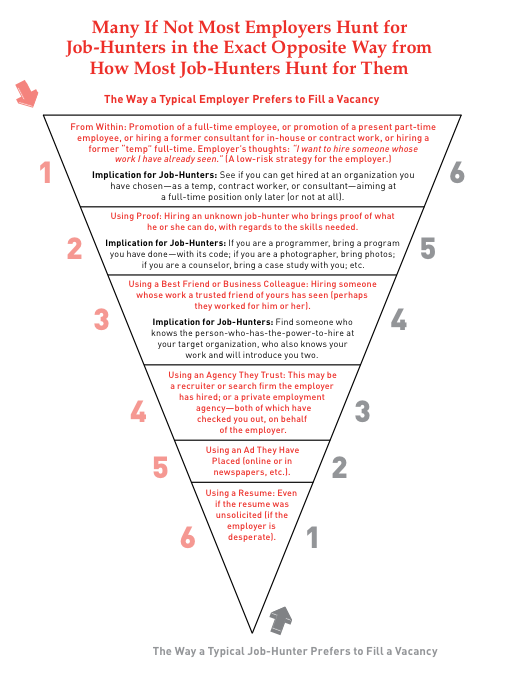Jobs
What To Beware Of, In Searching for Job Vacancies
Author: Dick Bolles
Experts guesstimate that 80% of all job vacancies are never listed; employers fill them in their own quiet way, as shown on this chart:
In other words, employers (as a group) never advertise a vacancy, until all other measures have failed. But that still leaves millions of openings, and consequently there are hundreds if not thousands of places (called "job boards") where employers go to list the vacancies they cannot otherwise fill. The Hansens' Quintessential Careers (www.quintessential careers.com ) has one of the most comprehensive lists of them all. The Undercover Recruiter (http://theundercoverrecruiter.com/ ) lists the best of them, in their view. Job Board Reviews has users' evaluation of even the smallest job boards ( http://jobboardreviews.com/ j And Ask the Headhunter (www.asktheheadhunter.com ) is where Nick Corcodilos does thorough, investigative reporter type articles about them. Bravo!
How to Look for A Job
Author: Dick Bolles

When you're looking for a job, there are two basic ways you can go about the task: pick a company just because you like it, or wait for some organization to announce they have a vacancy. Explain.
1. You Choose Where, and then You Approach Them, Now. Choose the places where you'd like to work and whether they have an advertised vacancy or not, approach them through people who know you but also know them (commonly called "your referrals" or "your contacts" though you may also think of them as "bridge people", as they form a bridge between you and that place.)
2. You Wait for A Vacancy. Wait for places to announce they have a vacancy and then either
a. Approach them through a person who knows you but also knows them (commonly called "your contacts"), or
b. Approach them by sending them your resume.
The virtue of the first approach above, is that you have few if any competitors, because they haven't announced they have a vacancy. On the other hand, if you follow the second approach, and wait until a vacancy is announced, well, you can have hundreds competing with you for that one job. Let's look at each of these two approaches, in more detail.
The Second Approach. The Vacancy Approach. You wait for places to announce they have a vacancy and then either
a. Approach them through a person who knows you but also knows them (commonly called "your contacts"), or
b. Approach them by sending them your resume.
Ah, where to find vacancies? Well, if we're talking online, the answer is: everywhere. The best sites (IMHO) are listed in the accompanying article in this section called Job Openings, (http://www.jobhuntersbible.com/jobs/category/jobs-list) . You can search through vacancies for hours, if you want to. You will find lots of listings. You will find lots of duplicates. You will find lots of outdated ads, floating out there in digital space like flotsam and jetsam. You may be astonished at how many listings there are, and yet not a one of them is of any interest to you.
Jobs with Friends is an unusual resource that begins with all your Friends on Facebook and all your Links on LinkedIn, then lists them automatically (once you give permission) and tells you where they work. According to a post-2008 survey, 65% of small business owners said that referrals are their #1 source of hires. The virtue of this site is that if you see a place you are attracted to, you already have a referral, or contact, or bridge person there, since the list began with those. You'll find Jobs with Friends here. It's free.
Sites That List Job Openings
Author: Dick Bolles

Employers rarely advertise a vacancy, until all other measures have failed. But once they decide to advertise, they generally turn to the Internet to do it. inasmuch as 87% of American adults now use the Internet. (That figure was just 14% back in 1995.) On the Internet there are hundreds if not thousands of places (many of them called "job boards") where employers go, to list the vacancies they cannot otherwise fill. Big boards, small niche boards focussed on just one industry or kind of job, recruiters' boards, employer's own website boards, and social media sites. The Hansens' Quintessential Careers (www.quintessential careers.com ) has one of the most comprehensive lists of them all.
For the 13% of American adults who are not on the Internet, employers will generally use classified ads in the nearest metropolitan Sunday newspaper to announce the openings they can't otherwise fill, as in the graphic above.
Here are the five most useful sites on the Internet—laptop, tablet, or mobile—in my opinion (just click on the urls, in blue, to search their listings):

INDEED (www.indeed.com ; also available as a mobile app Indeed Job Search) is a search engine that searches for only one thing: job openings. It scours the web for them, and pulls them up from anywhere and everywhere. This is technically called a job aggregator. INDEED is reputedly the largest aggregator in the world. It has jobs it picked up from job boards, company sites, sites with part-time jobs, and anywhere else on the Web.
 SIMPLYHIRED (www.simplyhired.com also available as a mobile app Job Search - SimplyHired ). It is Indeed's chief rival.
SIMPLYHIRED (www.simplyhired.com also available as a mobile app Job Search - SimplyHired ). It is Indeed's chief rival.

![]()
craigslist (www.craigslist.org) is not, technically, a job board. People, in fact, can advertise just about anything on this site (or to be more accurate, this family of sites). But quality jobs do tend to gravitate toward craigslist, and many job-hunters have found jobs listed here that they find nowhere else. Now, what did I mean by family of sites? Well, there are over 700 "cities" in 70 countries that have craigslist sites. (Some craigslist sites cover large regions instead of individual metropolitan areas.) So, when you type the url above into your search engine, you will find you are automatically taken to the craigslist site for the geographical area that you live in, or near. And only jobs that are near you, are advertised there. If you want to move to another area of the country (or the world) you're going to have to type in the name of that city or region. Very valuable site. Incidentally, that's Craig himself (Craig Newmark) in the brown coat above. He founded craigslist in 1995.

snagajob (http://www.snagajob.com/find-jobs) is the #1 job search site for part-time or hourly jobs. Its chief competitor is GROVEJOB (http://www.groovejob.com). If you're looking for part-time or contract jobs, teen jobs, summer jobs, or college jobs, you probably ought to look at both sites.

DICE (www.dice.com) is the primary site for information technology and engineering professionals looking for work. It lists as many as 80,000 jobs a day. Incidentally, in case you were curious (and I'll bet you were), DICE stands for "Data-processing Independent Consultant's Exchange."